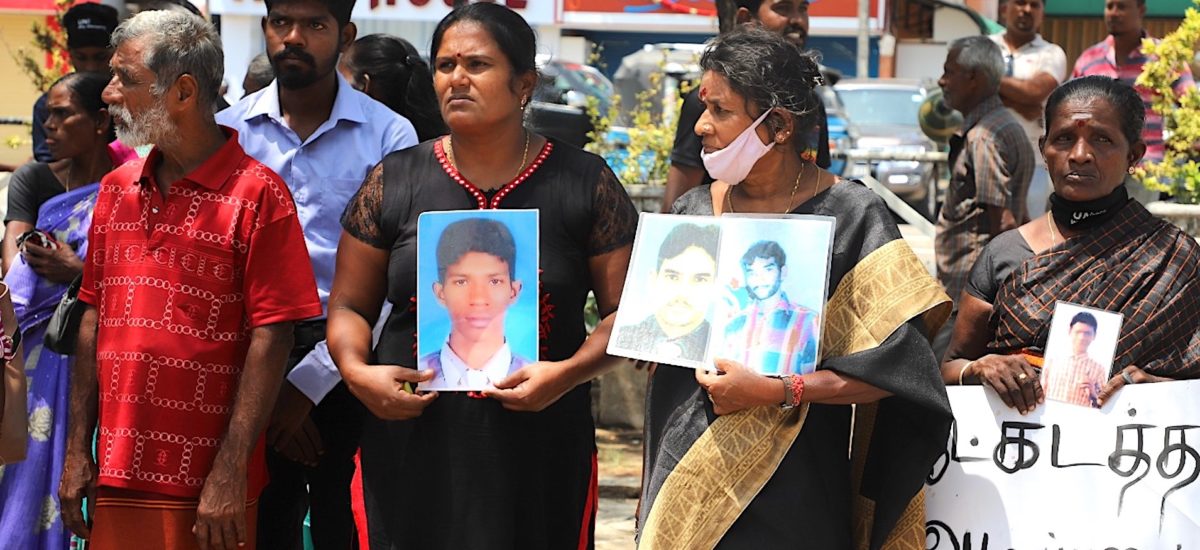Photo courtesy of Aleena Cader
It was a dramatic moment: a tall, well-built young man dressed in white with a black band tied across his forehead pushed his way through the closed gates of the church premises past the stern police officers and launched out into the street. Behind him came a large number of women, old and weather-beaten but showing the steely determination that had seen them through the worst of times. The chant that filled the air was “Where, where, where?”
The police were trying to enforce a court order preventing the march by the families of the disappeared in Batticaloa but probably decided that it was not worth the bad publicity to prevent a group of elderly women from walking down the street.
Thirty year-old Shanakiyan Rajaputhiran Rasamanickam is a national list member of the llankai Tamil Arasu Kadchi (ITAK) from the Batticaloa district and on that day he proved himself a champion of the women from across the Batticaloa, Trincomalee and Ampara districts who had come to commemorate the UN Day for Victims of Enforced Disappearances on August 30.
“It is a shame that the police have obtained a court order to stop a peaceful protest when these people are only looking justice. It is their right to know what has happened to their relatives…We have to make sure it doesn’t happen again,” he said.
The march of the mothers wound its way across the Kallady bridge and ended at Gandhi Park in Batticaloa town, a long walk in the searing heat for the women, who were carrying photographs of their lost children and husbands along with banners and placards that read “Do you still think we don’t deserve answers?” and “When will our disappeared return?”
The photographs held aloft by the marchers included those of three Catholic priests who are missing – Father Francis Joseph from Jaffna who organised the surrender of civilians to the military in May 2009 and boarded a bus with them never to be seen again; Father Jim Brown last seen in 2006 in Jaffna at a Navy checkpoint while he was trying to help injured civilians; and American Jesuit priest Father Eugene John Hebert from Batticaloa who disappeared in 1990 when travelling from Valaichchenai to Batticaloa.
Lalitha Ramakrishan, 61, from the Trincomalee district came to the march holding laminated colour photographs of her two sons, Prabanam (24) and Jegaruban (18) who taken from their home by armed men, whom she describes as being from the Navy, in 2008. She says her sons were not involved with the LTTE. Since then, Lalitha has appealed to the International Committee of the Red Cross and gone to police stations, the Boossa army camp, the Welikada prison and even to an army camp in Vavuniya. No one will give her any answers. But despite the odds, she believes that they are still alive. Some years ago she paid a large sum of money to someone who promised to return her sons but never did. Having received no assistance, Lalitha makes food that she sells to make a living.
In 2007, Mathi Letchumi’s son Sanka, 19, went out to buy a bulb from his home in Samanthurai in the Ampara district and never returned. The Army denied that they took him. Letchumi has been to the ICRC and numerous military camps. She wants to know if her son is dead or not. She has received no compensation and lives in a small hut, struggling to survive.
In a strong statement issued to mark the day, the International Truth and Justice Project (ITJP) said that at least 15 young Tamils had been granted refugee status in the UK since 2015 after being brutally tortured for seeking the whereabouts of their relatives.
“More than a decade after the war end, young Tamils, many of whom have siblings who disappeared in the war, have paid a terrible price for asking for the truth,” said the Executive Director of the ITJP, Yasmin Sooka. “On the International Day of the Disappeared, we remind the Sri Lankan state that it cannot continue to persecute and send white vans after those who just want to know what happened to their loved ones.”
The Office on Missing Persons (OMP) reported to the UN that it had 14,641 files on individuals and had received an additional 129 new complaints. While it has brought some relief and given support to those searching for the missing, the OMP has yet to follow through on any individual cases or to question military officers about their involvement in disappearances.
The ITJP statement focussed on one particular incident where it has collected 340 names of Tamils, including Father Francis Joseph and 29 children, who surrendered to the military on May 18, 2009 after the war finished and were taken away in a bus. They have been not been seen since. Witnesses put several military officers at the scene, including current Army commander Shavendra Silva. The ITJP expressed astonishment that the OMP has not questioned the officers who were present at the surrender.
“It is a travesty that hundreds of people can disappear on one day in one location and after more than a decade nobody in the military has even been questioned. Instead those who demand justice are further victimised,” said Ms. Sooka.
She also condemned Media Minister Kehilya Rambukwella for saying that half of those named in complaints to the OMP were living abroad, calling his statement “callous and disrespectful”. “How is it possible more than seven thousand people went abroad and didn’t bother to contact their children or mothers? What purpose would it serve for families in Sri Lanka to report them missing when this just brings surveillance and harassment from the authorities?” asked Ms. Sooka.

